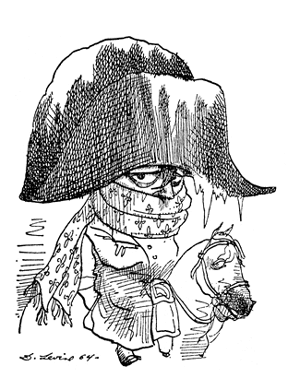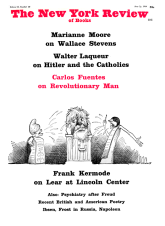For a century and a half now, Napoleon Bonaparte has been a projective test and a convenient symbol. Politicians rode to power by using his name and borrowing his charisma, patriots nostalgically invoked his image, royalists fed their resentments against the modern world by despising him. In this century, the dictators with their popular support, their grandiloquent lies, their manipulated plebiscites and quick appeal to violence, have driven many to find in Napoleon an object lesson; during the Second World War, the British kept up their morale against Hitler by recalling Napoleon’s failure to invade their island. Historians have been as tempted to project their own prejudices on Napoleon as everyone else, although, confronted with mountains of documents and the rigorous demands of their discipline, they have tried to make Napoleon an object of cool scientific inquiry instead of political passion. They have not fully succeeded: twenty years ago, Pieter Geyl concluded his Napoleon, For and Against, a masterly survey of what French historians have made of Napoleon, with a half-patient, half-exasperated shrug of the shoulders. “The argument,” he wrote, “goes on.”
For all its lucid reasonableness, Felix Markham’s new biography will do little to advance, and little to settle, that argument. It is a most useful book, and a most attractive one, both physically, with its unhackneyed illustrations, and intellectually, with its clarity of outline. It employs the latest research and the most recently discovered documents, and it makes deft use of both. Its narrative is accurate and its verdicts are judicious and often shrewd; clearly, Mr. Markham has no stake in turning Napoleon into a symbol, or making him into a stalking horse for his private fancies; he has wisely and explicitly refrained from drawing unhistorical comparisons. His is a professional historian’s biography: sober, fair, and responsible.
Yet its very real merits are compromised by the fact that the book is much too short, a serious error in judgment. In consequence, Georges Lefebvre’s Napoléon (a great work unfortunately still unavailable in English), and J. M. Thompson’s Napoleon Bonaparte: His Rise and Fall (an orderly and vigorous analysis) will remain the definitive works on the subject. In his Preface, Mr. Markham suggests that his is a “full-length” biography, but the adjective is misapplied. How long should a biography be to be full-length? Surely long enough to tell its story with reasonable completeness. Napoleon defies brevity: his career ranged too widely, touched too many men, issues, and events, to be recounted, as it is recounted here, in fewer than three hundred pages. Mr. Markham notes, accurately enough, that “for nearly twenty years the career of Napoleon and the history of Europe were almost synonymous.” this does not mean, to be sure, that Napoleon’s biographer must try to give that history in full (although Lefebvre attempted to do just that), but that he should paint a mural, not a miniature. As a result of his misplaced economy Mr. Markham often sounds breathless. In the preface, he announces apologetically that “Chapter Twelve on ‘Wagram’ opens with an analysis of the intellectual movement in Germany at the end of the eighteenth century; it is not irrelevant.” But this “analysis” consists of a hasty catalogue amounting to exactly one page. This (at least in a book that claims to be “full-length”) is not enough.
Such brevity only permits Mr. Markham to suggest, without fully exploring, the puzzling questions surrounding Napoleon’s motives and place in history. He does offer some illuminating vignettes: he finds space for Napoleon’s obsession with his family, his lust for fame, his magnetic effect on others; he notes the coarsening of Napoleon’s fiber as he secured absolute power, the weakening of political and military judgment as Napoleon went from deceptive success to deceptive success, and (although not so extensively as I should have liked) Napoleon’s brutal, utterly self-centered mendacity. At the end of his biography, however, Mr. Markham, generally so restrained, finds himself resorting to unwonted rhetoric, and that rhetoric is, I think, a sign of his bafflement:
At St. Helena Napoleon recalled that several times General Paoli had said to him, “You are a man of Plutarch, of antiquity.” His career has, indeed, the starkness of a Sophoclean tragedy; of hubris followed by nemesis. But it would need a Shakespeare as well as a Sophocles to do justice to the complexity of Napoleon’s personality, which makes the potentialities of his mind and character often more remarkable even than his achievements. We are confronted with the enigma of a man of great intelligence, yet often startlingly obtuse in his judgment of men, and events; a man intensely human, and even humane in his personal relationships, yet possessed by a daemon of ambition which puts him beyond the pale of humanity: in Aristotle’s definition, “either a beast or a god.”
This is modest enough to invite assent, and much of it is indisputably true. Napoleon was various, various enough to make Madame de Staël hate and Heine worship him; various enough to be saluted by Stendhal as the nemesis of boredom and to be detested by others, as perceptive as Stendhal, who preferred boredom to the kind of sanguinary excitement that Napoleon could provide. And Napoleon was extraordinary. But the concluding metaphor of Mr. Markham’s book points to a certain failure of nerve in the face of the extraordinary. To think of a man as either a beast or a god, even metaphorically, paralyzes judgment. There is every reason to wonder at Napoleon’s capacities and his career, but no reason to surrender to them. Napoleon is as fully documented as any man in modern history: we have caricatures, paintings, and statues, we have his contrived letters, lying bulletins, and self-glorifying reminiscences, and we are fortunately not compelled to rely on his own version of conversations and events, for they can be checked against the reports of eye-witnesses and assessed by skeptical researchers. We know how he behaved on 18 Brumaire, and what he contributed to the Code Napoléon. Knowing all this, we know that he was neither beast nor god, but quick-witted and energetic, decisive in action and articulate in writing. We know also that he ended less gloriously than he began, that he was ruined by power and flattery. Napoleon exported the ideals of the French Revolution and betrayed them at home. His Consulate had moments of true glory which the tawdry Empire, a time of artistic stagnation, intellectual pretentiousness, and pointless military exploits, never matched. We all remember Beethoven’s grand gesture: when he heard that Napoleon had connived in the murder of the Duc d’Enghien and made himself Emperor, he furiously struck out the dedication to Napoleon that he had placed at the head of his Eroica Symphony. “So he is also nothing more than an ordinary man!’ he exclaimed, in a pronouncement duly recorded by Mr. Markham. “Now he will trample on the rights of mankind and indulge only his own ambition; from now on he will make himself superior to all the others and become a tyrant.” Beethoven’s gesture, like his exclamation, was as just as it was melodramatic. Napoleon was one of the world’s greatest opportunists who passed up his greatest opportunity: in the years of his Consulate, he might have kept Europe at peace, and reorganized France without stifling its inner vitality and discarding half the gains of the Revolution. To do that, of course, he would have had to curb his ego, to moderate his ambitions. But then he would not have been Napoleon.
Advertisement
This Issue
June 25, 1964




